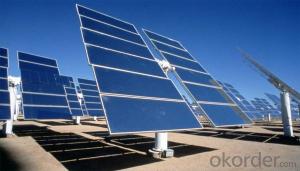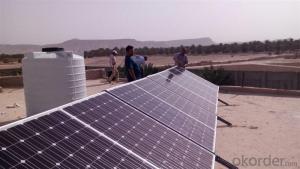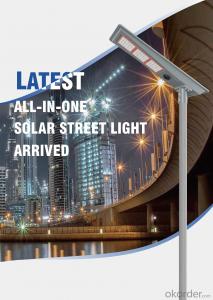Off-Grid Solar Power System 8KW High Efficiency
- Loading Port:
- China main port
- Payment Terms:
- TT OR LC
- Min Order Qty:
- 1 pc
- Supply Capability:
- 10000 pc/month
OKorder Service Pledge
OKorder Financial Service
You Might Also Like
1.Description of Product
Off-Grid Solar Power System is consisted of solar panel, solar charge controller, inverter, battery, mounting rack and cables.
(1).Grid-connected, send power to city grid
(2).MPPT technology, wide range of working voltage
(3).Simply Wiring, easy installation, customized design for your projects
(4).Low investment & long term feedback
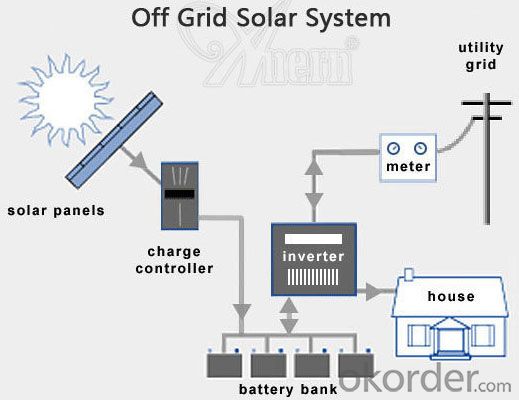
2. Off-Grid Features
1. Off grid solar power system is mainly used for application with relatively-small power consumption, and the areas have no grid network coverage, or grid power is unstable or outage condition.
2. It’s composed of solar panels, hybrid solar inverter, battery bank, solar panel mounting racks, and other accessories required fora complete home solar power system.
3. The battery bank gives a stable power output to the solar inverter which converts DC to AC to power loads, and provides power backup in rainy or cloudy days.
4. The solar panels generate electricity at daytime and charge the battery bank .
5. The off grid home solar power system provides grid power bypass in case of battery power shortage when sunshine is not enough.
6. All the off grid home solar power system configurations are worked out by scientific calculation and design.
The Product Parameter | |
Ref No. | 8KW |
Solar Panel | Type: Monocrystalline Silicon PV Module Max Power: 250W QTY:16 pcs |
Controller-Inverter Integrator | Rated Ouput Power: 5000W Rated DC Voltage: 48V QTY:1 pcs |
Battery | 12V/200AH per piece QTY:12 pcs |
Solar Panel Rack | Roof type mounting rack, anodized aluminum material, including complete fittings (Other type of racks can be customized as per client's requirement) QTY:1 pcs |
Cables | International standard, with specification suitable for solar system, BVV1*10 QTY:80m |
3.The Pictures of Product
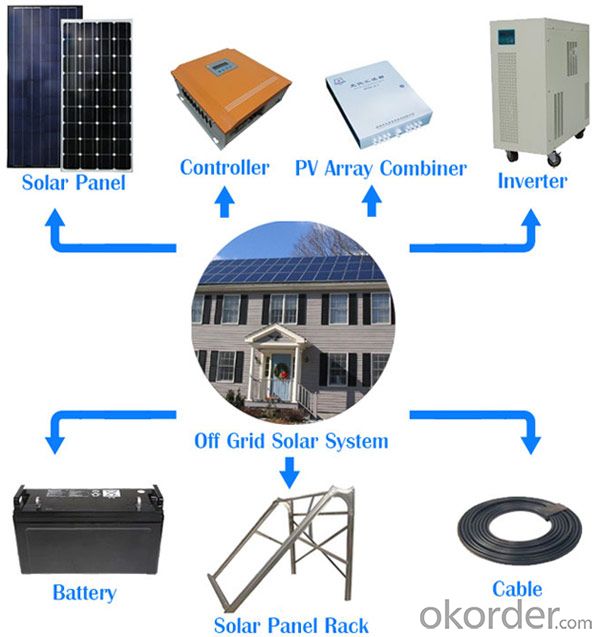
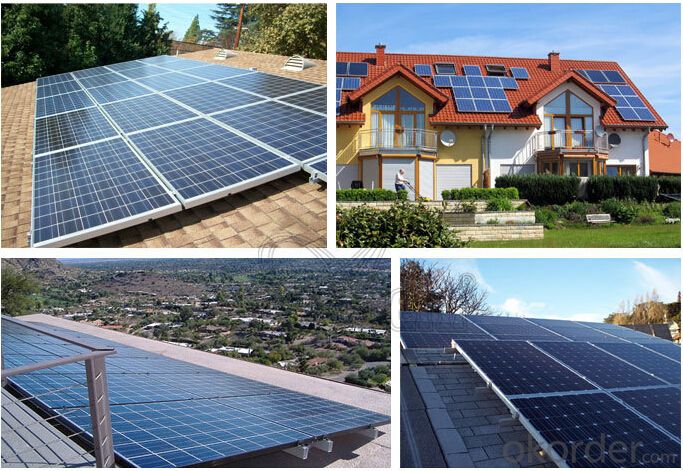
4.FAQ
Q1: What is the business type for the company?
A1: We are one of the biggest manufacturers inBejing.Chnia. Which is a high tech PV enterprise dedicated to the research, development, production and sales..
Q2: How long solar panel warranty can you offer?
A2: 10-Year product warranty,25-year linear power output warranty
If there is any quality problem, we will pay for freight and send free parts to you.
Q3: How many certificates do you have?
A3: We have 16 certificates,such as CE, TUV, UL, and so on.
Q4: Can I be the agent for you?
A4: Yes,We can discuss some information.
Q5: How to get a sample?How can cooperation with us
A5: contact us now.
- Q:Can solar energy systems be used in areas with frequent hurricanes?
- Yes, solar energy systems can be used in areas with frequent hurricanes. However, it is important to design and install them in a way that takes into account the specific challenges posed by hurricanes, such as high winds and potential debris impact. Reinforced mounting systems, robust solar panels, and proper installation techniques can help ensure the durability and resilience of solar energy systems in hurricane-prone areas. Additionally, incorporating battery storage can provide energy backup during power outages caused by hurricanes.
- Q:Can a solar energy system be installed in a coastal area?
- Yes, a solar energy system can be installed in a coastal area. In fact, coastal areas can be ideal locations for solar installations due to their abundant sunlight and proximity to the ocean. However, there are certain factors that need to be considered when installing a solar energy system in a coastal area. One of the primary considerations is the corrosive nature of the salty air in coastal regions. Salt can accelerate the degradation of certain components of a solar system, such as metal frames, electrical connections, and even the solar panels themselves. To combat this, it is essential to use corrosion-resistant materials and regularly clean and maintain the system to remove any salt buildup. Another consideration is the potential impact of strong winds and storms that are common in coastal areas. Solar panels and mounting structures need to be designed and installed to withstand these extreme weather conditions. Reinforced anchoring and proper installation techniques can help ensure the stability and durability of the system in high wind areas. Additionally, it is important to assess the impact of coastal erosion or flooding on the solar energy system's location. Proper site selection and elevation can help minimize the risk of damage from these environmental factors. Despite these challenges, with proper planning, design, and maintenance, a solar energy system can be successfully installed and operated in a coastal area. The benefits of harnessing the abundant sunlight in these regions can outweigh the potential challenges, making solar energy a viable and sustainable option for coastal communities.
- Q:How do solar energy systems contribute to reducing greenhouse gas emissions?
- Solar energy systems contribute to reducing greenhouse gas emissions in several ways. Firstly, solar power is a renewable energy source that does not release any harmful greenhouse gases during its operation. By replacing fossil fuel-based electricity generation, solar energy systems significantly decrease the amount of carbon dioxide and other greenhouse gases emitted into the atmosphere. Secondly, solar energy can be used for heating and cooling purposes, reducing the reliance on fossil fuel-powered systems that contribute to greenhouse gas emissions. Lastly, the widespread adoption of solar energy systems encourages a shift towards a more sustainable and environmentally friendly energy mix, leading to long-term reductions in greenhouse gas emissions.
- Q:Do solar energy systems require grounding?
- Grounding is crucial for solar energy systems, as well as any other electrical system, for safety reasons. It serves as a protection against electrical faults, lightning strikes, and other potential dangers. In a solar energy system, grounding is typically accomplished by connecting all metal components, such as solar panels, inverters, and racking systems, to a common ground. This is done by using grounding wires or cables that are linked to a grounding electrode, like a grounding rod or a metal water pipe. Grounding plays various important roles in solar energy systems. Firstly, it safeguards against electrical shock hazards by providing a safe pathway for electrical currents in case of a fault or malfunction. Additionally, grounding helps prevent damage to the system by diverting lightning strikes or other electrical surges away from sensitive components. Moreover, grounding is mandatory according to electrical codes and regulations. These codes ensure the safe installation and operation of solar energy systems, adhering to industry standards. Failure to comply with grounding requirements can lead to safety risks, equipment harm, or even legal consequences. In conclusion, grounding is an essential and significant aspect of solar energy systems. It guarantees the system's and its operators' safety, shields against electrical faults and lightning strikes, and ensures adherence to electrical codes and regulations.
- Q:Can a solar energy system be installed on a tile roof?
- Yes, a solar energy system can be installed on a tile roof. In fact, tile roofs are one of the most common types of roofs where solar panels can be installed. Special mounting brackets are used to secure the panels onto the tiles without damaging them. The process requires careful installation techniques to ensure the integrity of both the roof and the solar system.
- Q:How does a solar panel generate electricity?
- A solar panel generates electricity through the photovoltaic effect, where sunlight is converted into electrical energy. This process occurs when the photons in sunlight strike the solar cells within the panel, causing the electrons in the cells to be excited and flow as an electric current.
- Q:Can solar energy systems be used for powering military or defense installations?
- Certainly, military and defense installations can utilize solar energy systems to power their operations. In fact, numerous military and defense organizations worldwide are increasingly adopting solar energy systems as a dependable and sustainable power source. There are multiple reasons why solar energy systems are suitable for military and defense installations. Firstly, solar power is an abundant and widely accessible renewable energy source. This implies that military installations located in remote or off-grid areas can still have access to electricity without depending on costly and logistically challenging traditional fossil fuel-based generators. Additionally, solar energy systems offer a decentralized power supply option, reducing dependence on vulnerable and centralized power grids. This diminishes the susceptibility of military installations to power outages or attacks on critical infrastructure. Solar panels can be conveniently installed on rooftops, parking lots, or unused land within the military base, making optimal use of available space. Furthermore, solar energy systems necessitate minimal maintenance when compared to conventional power generation methods. This is especially advantageous for military or defense installations situated in remote or hostile environments, where regular maintenance and fuel supply for generators may be difficult or risky. Solar panels are long-lasting and durable, requiring only occasional cleaning and routine inspections. In addition to their reliability and resilience, solar energy systems offer economic advantages. By reducing reliance on fossil fuels, military installations can lower their operational costs and potentially save substantial amounts of money in the long term. These savings can then be allocated to other critical defense needs or utilized for the research and development of advanced military technologies. Moreover, the deployment of solar energy systems for military installations aligns with the global trend towards clean and sustainable energy solutions. It showcases a commitment to reducing greenhouse gas emissions and mitigating the impact of climate change, contributing to the overall sustainability objectives of military organizations. In conclusion, solar energy systems are a viable and practical choice for powering military or defense installations. They provide reliability, resilience, cost savings, and environmental benefits, making them an appealing option for military organizations seeking to optimize their energy supply and decrease their carbon footprint.
- Q:Can solar energy systems be used in areas with high levels of bird activity?
- Solar energy systems can indeed be used in areas where there are many birds. However, it is crucial to take precautions in order to ensure the safety of the birds and the optimal performance of the solar panels. A common concern is the possibility of birds colliding with the panels. To address this, manufacturers often include bird deterrents such as mesh screens or reflective coatings on the panels, which make them more visible to birds and decrease the risk of collisions. Additionally, proper installation and maintenance of the solar energy systems can minimize potential nesting or roosting sites for birds, thus reducing the likelihood of damage to the panels. By addressing these considerations, it is possible to effectively utilize solar energy systems in areas with high bird activity while still protecting the local bird population.
- Q:Can a solar energy system power an entire home or business?
- Yes, a properly designed and sized solar energy system can power an entire home or business. The system should be tailored to the energy needs of the property, taking into account factors such as energy consumption, available roof or ground space for solar panels, and geographic location to ensure sufficient power generation. With advanced technology and efficient solar panels, it is possible to achieve energy independence and offset the majority, if not all, of the electricity requirements with solar energy.
- Q:Can solar energy systems be used in areas with limited land availability?
- Yes, solar energy systems can be used in areas with limited land availability through various innovative approaches. For instance, rooftop solar panels can be installed on buildings to utilize the available space efficiently. Additionally, solar energy can be harnessed through the installation of solar panels on vertical surfaces, such as walls or fences, or through the use of floating solar farms on lakes or reservoirs. These creative solutions allow for the utilization of solar energy even in areas where land availability is limited.
1. Manufacturer Overview |
|
|---|---|
| Location | |
| Year Established | |
| Annual Output Value | |
| Main Markets | |
| Company Certifications | |
2. Manufacturer Certificates |
|
|---|---|
| a) Certification Name | |
| Range | |
| Reference | |
| Validity Period | |
3. Manufacturer Capability |
|
|---|---|
| a)Trade Capacity | |
| Nearest Port | |
| Export Percentage | |
| No.of Employees in Trade Department | |
| Language Spoken: | |
| b)Factory Information | |
| Factory Size: | |
| No. of Production Lines | |
| Contract Manufacturing | |
| Product Price Range | |
Send your message to us
Off-Grid Solar Power System 8KW High Efficiency
- Loading Port:
- China main port
- Payment Terms:
- TT OR LC
- Min Order Qty:
- 1 pc
- Supply Capability:
- 10000 pc/month
OKorder Service Pledge
OKorder Financial Service
Similar products
New products
Hot products
Hot Searches
Related keywords
